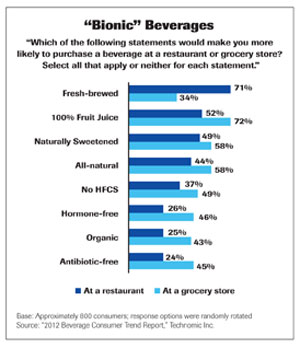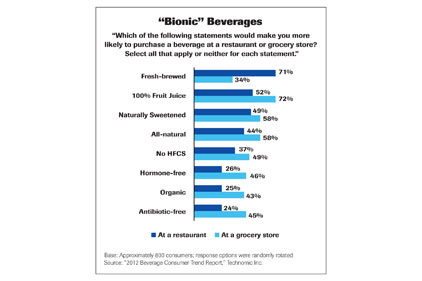
|
In its just-released “Beverage Consumer Trend Report,” Technomic asked consumers about select health-halo terms attached to beverages. Consumers are most apt to buy a beverage featuring the descriptor “fresh-brewed” at restaurants. Some 71% of consumers say they’d be more likely to purchase a beverage carrying this label at restaurants—a far greater percentage than for any other descriptor measured. Just 34% of them look for this attribute at grocery stores.
Another descriptor, “100% fruit juice,” holds more sway at grocery stores. Nearly three in four consumers (72%) say they’d be more inclined to buy a beverage labeled as “100% fruit juice” from a grocery store; a lower—but still significant percentage (52%)—would do the same at restaurants.
Consumers attach different degrees of importance to health-halo descriptors, depending on whether they’re in a foodservice or retail setting. For example, more than two fifths of consumers say “hormone-free,” “antibiotic-free” and “organic” labels could sway their purchasing decisions at grocery stores; roughly a quarter say that could happen at restaurants. It’s worth pointing out that restaurant percentages, although lower, are still significant.
Descriptors that speak to a product’s natural properties, namely “naturally sweetened” and “all-natural,” influence roughly half of restaurant-goers’ drink purchases. A few examples of how restaurants are incorporating popular descriptors into their menus:
• Orange juice—100% pure, fresh orange juice (Au Bon Pain).
• Fruit-flavored teas and lemonades—all-natural fruit purées with freshly brewed iced teas in strawberry or mango flavors (Beef ‘O’ Brady’s).
• Herbal teas—a selection of hot, organic herbal teas (First Watch).
Despite these restaurant examples, retail examples are often more numerous. For instance, Technomic found just 27 mentions of “corn syrup” on leading restaurant menus. In comparison, countless beverage brands, including Boylan’s Sodas, Jones Pure Cane Soda, Nantucket Nectars and Sierra Mist Natural, promote their disuse of high-fructose corn syrup (HFCS).
Technomic has consistently found that consumers tend to eat more healthfully at home and generally see restaurant visits as a time to indulge, which helps explain the lower health-attribute ratings at restaurants. Some health-minded drink manufacturers are attempting to overcome this by making a single product line available in both channels.
Organic bottled-tea company Honest Tea recently made its fresh-brewed, iced tea system available to foodservice retailers. The initiative presents a viable way for a retail processor to break into the foodservice market. It also ensures that both production methods and ingredients that form the cornerstone of its beverage business are conveyed to new customers.
Health-halo claims influence a sizeable percentage of beverage consumers, but to different degrees, depending on where they’re buying their drinks. As more beverages touting ingredients (or lack of ingredients) make their way into restaurants, consumers may be even more influenced by such claims.
